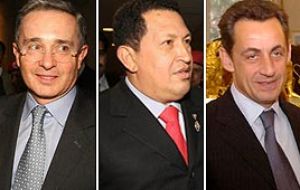MercoPress. South Atlantic News Agency
France asks Colombia for another “broker” chance for Chavez
 Ptes. Uribe, Chavez and Sarkozy
Ptes. Uribe, Chavez and Sarkozy France has urged Colombia to reconsider its decision to end the efforts of Venezuelan President Hugo Chavez to negotiate with the Farc rebel group. President Nicolas Sarkozy said Mr Chavez was still the best person to broker an exchange of 45 of the Farc's hostages for 500 imprisoned guerrillas
The hostages include Ingrid Betancourt, a French-Colombian kidnapped in 2002. Earlier, Colombia's president said Mr Chavez had broken an agreement not to speak to the country's army leaders. The Venezuelan leader had only days ago been given until 31 December to mediate the release of the hostages. Apparently Colombian President Alvaro Uribe had grown frustrated by Chavez and his apparent disregard for following the proper diplomatic channels on the issue since he was invited to mediate in August. Speaking after Mr Chavez's involvement was "terminated" by Colombia, President Sarkozy's spokesman said France had reiterated its support for the Venezuelan leader's mediation efforts and urged Bogota to restart dialogue with him. "We continue to think that President Chavez is the best chance of securing the release of Ingrid Betancourt and all the other hostages currently held by the FARC in Colombia," David Martinon told a news conference in Paris. However, Mr Martinon said President Sarkozy would "wait for the temperature to cool a little" before he phoned his Colombian counterpart to discuss the issue. Ms Betancourt, who has dual Colombian and French nationality, was captured during the presidential election campaign in February 2002 when, against government advice, she tried to reach a remote village used for talks with the Farc. Her former husband, Fabrice Delloye, also expressed his dismay at the Colombian decision. "This is a tragic step, because whatever President Chavez's personality may be, he was essential in perhaps reaching a humanitarian agreement," he told the radio station France Info. "Once again, and the world is witnessing it, Colombian President Uribe is an extremely difficult man who can change his views from one day to the next" he said in an interview with radio France Info. Ms Betancourt's sister, Astrid, said the family had been "stunned" by the move and demanded that the Colombian government reinstate Mr Chavez. "You have to know that we have complete confidence in President Chavez in the conduct of negotiations, that we know that this is the only alternative to be able to make sure Ingrid and the other hostages regain their freedom," she told French LCI television. On Tuesday, Mr Chavez made a high-profile visit to Paris to meet the French president and Ms Betancourt's family. Contrary to what was announced originally Chavez did not bring along evidence that Ms Betancourt was alive. Afterwards, he revealed he had received a written assurance from Farc leader Manuel Marulanda that evidence proving the hostages were alive would be forthcoming "before the end of the year". The Venezuelan leader was invited, along with Colombian opposition Senator Piedad Cordoba, to mediate in the hostage crisis in August. But on Wednesday evening, the office of President Uribe announced in a statement that their facilitation efforts had been "terminated". The statement said Senator Cordoba had telephoned Colombian army chief Gen Mario Montoya, and then passed the phone to President Chavez. Uribe had previously made it clear to Chavez that he was opposed to the Venezuelan leader being in direct communication with Colombia's military chiefs. In Colombia the decision comes after several days of growing frustration in the Uribe administration with Mr Chavez and his apparent disregard for the proper diplomatic channels on the hostage issue. Earlier this week, the Colombian government imposed a deadline of 31 December on Mr Chavez to come up with results in the prisoner swap, after he spoke to the media in Paris about private discussions he had held with President Uribe.




Top Comments
Disclaimer & comment rulesCommenting for this story is now closed.
If you have a Facebook account, become a fan and comment on our Facebook Page!